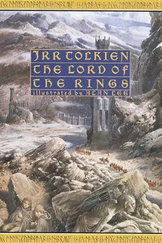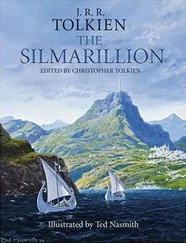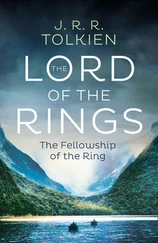J Tolkien - The Silmarillon
Здесь есть возможность читать онлайн «J Tolkien - The Silmarillon» весь текст электронной книги совершенно бесплатно (целиком полную версию без сокращений). В некоторых случаях можно слушать аудио, скачать через торрент в формате fb2 и присутствует краткое содержание. Год выпуска: 1985, ISBN: 1985, Издательство: Del Rey, Жанр: Эпическая фантастика, на английском языке. Описание произведения, (предисловие) а так же отзывы посетителей доступны на портале библиотеки ЛибКат.
- Название:The Silmarillon
- Автор:
- Издательство:Del Rey
- Жанр:
- Год:1985
- ISBN:0345325818
- Рейтинг книги:5 / 5. Голосов: 1
-
Избранное:Добавить в избранное
- Отзывы:
-
Ваша оценка:
- 100
- 1
- 2
- 3
- 4
- 5
The Silmarillon: краткое содержание, описание и аннотация
Предлагаем к чтению аннотацию, описание, краткое содержание или предисловие (зависит от того, что написал сам автор книги «The Silmarillon»). Если вы не нашли необходимую информацию о книге — напишите в комментариях, мы постараемся отыскать её.
Those interested in J.R.R. Tolkien's Middle Earth should not be without this grand volume that tells the tragic tale of the struggle for control of the Silmarils, a struggle that would determine the history of the world long before the War of the Ring.
The Silmarillon — читать онлайн бесплатно полную книгу (весь текст) целиком
Ниже представлен текст книги, разбитый по страницам. Система сохранения места последней прочитанной страницы, позволяет с удобством читать онлайн бесплатно книгу «The Silmarillon», без необходимости каждый раз заново искать на чём Вы остановились. Поставьте закладку, и сможете в любой момент перейти на страницу, на которой закончили чтение.
Интервал:
Закладка:
Now all these things were achieved for the most part by the counsel and vigilance of Mithrandir, and in the last few days he was revealed as a lord of great reverence, and clad in white he rode into battle; but not until the time came for him to depart was it known that he had long guarded the Red Ring of Fire. At the first that Ring had been entrusted to Cirdan, Lord of the Havens; but he had surrendered it to Mithrandir, for he knew whence he came and whither at last he would return.
‘Take now this Ring,’ he said; 'for thy labours and thy cares will be heavy, but in all it will support thee and defend thee from weariness. For this is the Ring of Fire, and herewith, maybe, thou shalt rekindle hearts to the valour of old in a world that grows chill. But as for me, my heart is with the Sea, and I will dwell by the grey shores, guarding the Havens until the last ship sails. Then I shall await thee.’
White was that ship and long was it a-building, and long it awaited the end of which Cirdan had spoken. But when all these things were done, and the Heir of Isildur had taken up the lordship of Men, and the dominion of the West had passed to him, then it was made plain that the power of the Three Rings also was ended, and to the Firstborn the world grew old and grey. In that time the last of the Noldor set sail from the Havens and left Middle-earth for ever. And latest of all the Keepers of the Three Rings rode to the Sea, and Master Elrond took there the ship that Cirdan had made ready. In the twilight of autumn it sailed out of Mithlond, until the seas of the Bent World fell away beneath it, and the winds of the round sky troubled it no more, and borne upon the high airs above the mists of the world it passed into the Ancient West, and an end was come for the Eldar of story and of song.
NOTE ON
The following note is intended simply to clarify a few main features in the pronunciation of names in the Elvish languages, and is by no means exhaustive. For full information on the subject see The Lord of the Rings Appendix E.
C
always has the value of k, never of s; thus Celeborn is 'Keleborn' not 'Seleborn'. In a few cases, as Tulkas, Kementari a k has been used in the spelling in this book. always has the value of ch in Scotch loch or German buch, never that of ch in English church. Examples are Carcharoth. Erchamion.
G
is always used to represent the sound of a voiced ('soft') th in English, that is the th in then, not the th in thin.
Examples are Maedhros, Aredhel, Haudh-en-Arwen. always has the sound of English g in get; thus Region, Eregion are not pronounced like English region, and the first syllable of Ginglith is as in English begin not as in gin.
Consonants written twice are pronounced long; thus Yavanna has the long n heard in English unnamed, penknife, not the short n in unaimed, penny.
VOWELS
has the sound of English eye; thus the second syllable of Edain is like English dine, not Dane.
has the value of English ow in town; thus the first syllable of Aule is like English owl, and the first syllable of Sauron is like English sour, not sore.
as in Teiglin has the sound of English grey.
IE
should not be pronounced as in English piece, but with both the vowels i and e sounded, and run together; thus Ni-enna, not 'Neena'.
as in Uinen has the sound of English ruin.
as in Aegnor, Nirnaeth, and OE as in Noegyth, Loeg, are combinations of the individual vowels, a-e, o-e, but ae may be pronounced in the same way as ai, and oe as in English toy EA and EO are not run together, but constitute two syllables; these combinations are written ea and eo (or, when they begin names, Ea and Eo: Earendil, Eonwe).
U
in names like Hurin, Turin, Tuna should be pronounced oo; thus 'Toorin' not 'Tyoorin'.
ER, IR, UR before a consonant (as in Nerdanel, Cirdan, Gurthang) or at the end of a word (as in Ainur) should not be pronounced as in English fern, fir, fur, but as in English air, eer, oor.
E
at the end of words is always pronounced as a distinct vowel, and in this position is written e. It is likewise always pronounced in the middle of words like Celeborn, Menegroth.
A circumflex accent in stressed monosyllables in Sindarin denotes the particularly long vowel heard in such words (thus Hin Hurin); but in Adunaic (Numenorean) and Khuzdul (Dwarvish) names the circumflex is simply used to denote long vowels.
Since the number of names in the book is very large, this index provides, in addition to page-references, a short statement concerning each person and place. These statements are not epitomes of all that is said in the text, and for most of the central figures in the narrative are kept extremely brief; but such an index is inevitably bulky, and I have reduced its size in various ways.
The chief of these concerns the fact that very often the English translation of an Elvish name is also used as the name independently; thus for example the dwelling of King Thingol is called both Menegroth and 'The Thousand Caves' (and also both together). In most such cases I have combined the Elvish name and its translated meaning under one entry, with the result that the page-references are not restricted to the name that appears as the heading (e.g., those under Echoriath include those to 'Encircling Mountains'). The English renderings are given separate headings, but only with a simple direction to the main entry, and only if they occur independently. Words in inverted commas are translations; many of these occur in the text (as Tol Eressea 'the Lonely Isle'), but I have added a great many others.
Information about some names that are not translated is contained in the Appendix.
With the many titles and formal expressions in English whose Elvish originals are not given, such as 'the Elder King' and 'the Two Kindreds', I have been selective, but the great majority are registered. The references are in intention complete (and sometimes include pages where the subject of the entry occurs but is not actually mentioned by name) except in a very few cases where the name occurs very frequently indeed, as Beleriand, Valar. Here the word passim is used, but selected references are given to important passages; and in the entries for some of the Noldorin princes the many occurrences of the name that relate only to their sons or their houses have been eliminated.
References to The Lord of the Rings are by title of the volume, book, and chapter.
Adanedhel 'Elf-Man', name given to Turin in Nargothrond. 258 Adunakhor 'Lord of the West', name taken by the nineteenth King of Numenor, the first to do so in the Adunaic (Numenorean) tongue; his name in Quenya was Herunumen. 330 Adurant The sixth and most southerly of the tributaries of Gelion in Ossiriand. The name means 'double stream', referring to its divided course about the island of Tol Galen. 147, 229, 290 Aeglos 'Snow-point', the spear of Gil-galad. 364 Aegnor The fourth son of Finarfin, who with his brother Angrod held the northern slopes of Dorthonion; slain in the Dagor Bragollach. The name means 'Fell Fire', 64,94, 141, 180-82 Aelin-uial 'Meres of Twilight', where Aros flowed into Sirion. 133,145, 203, 267, 285 Aerandir 'Sea-wanderer', one of the three mariners who accompanied Earendil on his voyages. 307 Aerin A kinswoman of Hurin in Dor-lomin; taken as wife by Brodda the Easterling; aided Morwen after the Nirnaeth Arnoediad. 243, 264 Aftercomers The Younger Children of Iluvatar, Men; translation of Hildor, 92-3, 114 Agarwaen 'Blood-stained', name given to himself by Turin when he came to Nargothrond. 257 Aglarond 'The Glittering Cavern' of Helm's Deep in Ered Nimrais (see The Two Towers III 8). 361 Aglon 'The Narrow Pass', between Dorthonion and the heights to the west of Himring. 147, 161, 183-4 Ainulindale 'The Music of the Ainur', also called The (Great) Music, The (Great) Song. 3-9, 18, 21, 37-8, 43-4, 50, 74, 121, 251. Also the name of the account of Creation said to have been composed by Rumil of Tirion in the Elder Days. 82 Ainur 'The Holy Ones' (singular Ainu)', the first beings created by Iluvatar, the 'order' of the Valar and Maiar, made before Ea. 3-9, 18, 21, 41, 44, 58, 121, 251, 288 Akallabeth 'The Downfallen', Adunaic (Numenorean) word equivalent in meaning to Quenya Atalante. 347 Also the title of the account of the Downfall of Numenor. 359,360 Alcarinque 'The Glorious', name of a star. 48 Alcarondas The great ship of Ar-Pharazon in which he sailed to Aman. 343 Aldaron 'Lord of Trees', a Quenya name of the Vala Orome; cf. Tauron. 22 Aldudenie 'Lament for the Two Trees', made by a Vanyarin Elf named Elemmire. 84 Almaren The first abode of the Valar in Arda, before the second onslaught of Melkor: an isle in a great lake in the midst of Middle-earth. 30-1, 117 Alqualonde 'Haven of the Swans', the chief city and haven of the Teleri on the shores of Aman. 63-5, 79, 97, 100, 120, 130, 154, 188, 309, 311
Читать дальшеИнтервал:
Закладка:
Похожие книги на «The Silmarillon»
Представляем Вашему вниманию похожие книги на «The Silmarillon» списком для выбора. Мы отобрали схожую по названию и смыслу литературу в надежде предоставить читателям больше вариантов отыскать новые, интересные, ещё непрочитанные произведения.
Обсуждение, отзывы о книге «The Silmarillon» и просто собственные мнения читателей. Оставьте ваши комментарии, напишите, что Вы думаете о произведении, его смысле или главных героях. Укажите что конкретно понравилось, а что нет, и почему Вы так считаете.












